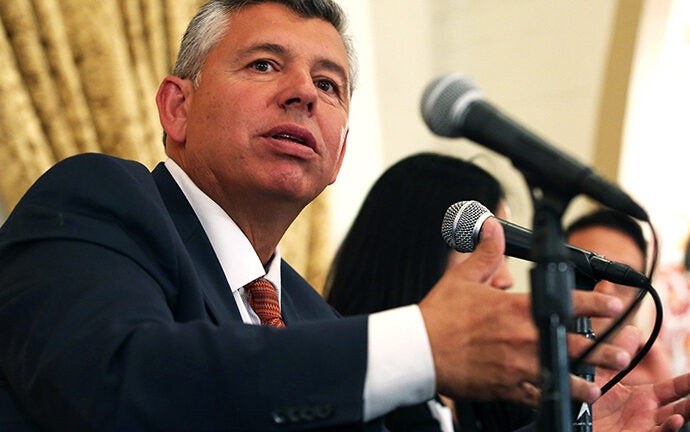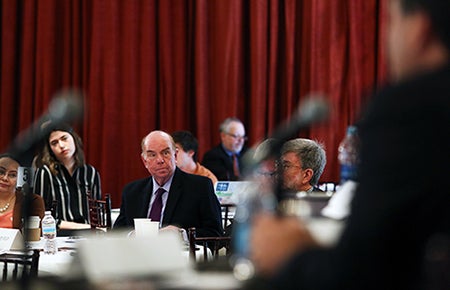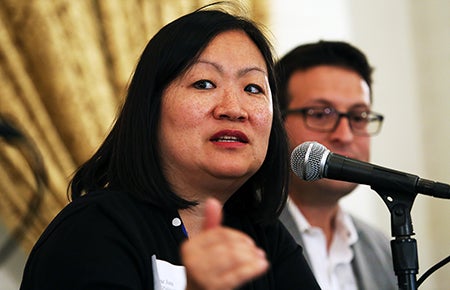
Trump at Home: Conference examines President Trump’s first 100 days in office
As the nation remains deeply divided over the policies of President Donald Trump, leading experts from across the political spectrum participated in the “First 100 Days Conference” hosted by USC Dornsife’s Department of Political Science and Jesse M. Unruh Institute of Politics.
In the first of two articles exploring issues raised at the conference, we look at “Trump at Home.” Taking part in the April 26 panel discussion on Trump’s domestic policy were USC Dornsife’s Jane Junn, professor of political science, and Matthew Kahn, professor of economics, spatial sciences and environmental studies; Ron Christie, BBC political commentator and a former special assistant to President George W. Bush; Ron Klain, former chief of staff to Joe Biden and Al Gore and a former Clinton 2016 adviser; and Abel Maldonado, former lieutenant governor of California (2010-11).
USC Dornsife’s Morris Levy, assistant professor of political science, moderated.
An unorthodox beginning?
Noting that the Trump campaign was unlike any other in modern American history, Levy opened the discussion by asking whether the president’s first 100 days mirrored the campaign’s unconventional nature.
For Klain, three things stood out. First, despite important opportunities for bipartisanship stemming from the fact he is the president least beholden to a major political party in 50 years, Trump has governed so far as a traditional Republican.
Second, Klain said he was surprised at the degree to which Trump has abandoned his economic populist agenda in the first 100 days. “On Oct. 22, he outlined a … plan of 10 things that were economically related, and said he’d try to get it done in the first 100 days. Nine of them he didn’t even send to Congress in the first 100 days, let alone get done,” Klain said.

Director of the Unruh Institute of Politics Robert Shrum was among those attending the conference.
Third, he addressed staffing. “There’s never been a modern president who’s done less in terms of staffing his government in the first 100 days than Donald Trump,” Klain said. “That will have consequences if there’s some kind of crisis.”
Maldonado defended Trump’s staffing issues, but agreed it was risky. “[Trump] is a business man first, you have to understand where he comes from,” he said. “This is a man who was running a multi-billion-dollar company with 30 people … probably a third of [whom] were his family …. I’d venture to guess that he sees that as savings for the Federal government when it comes to resources.”
Maldonado said not understanding the Federal government is a huge operation was a mistake he believed Trump would correct.
Communication and credibility
Levy asked whether Trump has damaged his credibility though staffing issues, infighting and what Christie described as “the Twitter presidency.”
Klain clearly felt he has.
“Even Republicans say he’s the most dishonest president we’ve had in modern times,” he said. “He lies almost every day. That is not a good thing for a president, and even if some of those lies rally his supporters and appease his voters …, ultimately it erodes his credibility as president, and there will come a day when he will want that credibility and it won’t be there ….”
While Junn thought Trump’s communication style might benefit him with his most fervent supporters, she did not think it would be help him with informed political observers.
“Over time, if the President continues to provide commentary such as the former president wire-tapped him, or other elements that are equally as derisive, divisive, accusatory or defensive, I think there can be a long-term deleterious effect ….,” she warned. “That will be important in 2018.”
Tax reform
Kahn noted that economists could not be sure of the economic consequences of Trump’s proposed tax reforms.
“I think the tax reform President Trump is pushing will increase income inequality. Will we also get the economic growth that’s promised?” Kahn said. “When the experts know that they don’t know what we will get from a policy, how do you proceed?”
Klain noted that Trump promised voters a middle class tax cut. “Something like that probably would have bipartisan support. But if his agenda really is a bunch of corporate tax breaks … he’s going to find a lot of fighting on Capitol Hill.”

Jane Junn, professor of political science, makes a point.
Dealing with Congress
Christie said a growing rift is starting to develop behind the scenes between congressional and White House Republicans.
Levy noted one of the signature pieces of advice in Trump’s book, The Art of the Deal, is to arrive with a proposal that goes beyond what you expect to get, and always be ready to walk away from the table.
“A couple of times we’ve seen Trump do what was once unthinkable, which is to pull the plug on something [and] back off,” he said. “We saw that on the ‘repeal and replace Obamacare,’ and we recently saw it on the negotiations to avoid a government shut-down, where it seems that Trump has backed off the wall, at least as something that he’s insisting on immediately.”
What does this kind of strategy do to a president’s bargaining position vis-a-vis Congress?
“To be a successful president, you have to get things done,” said Klain. “To get things done in Washington … you have to make deals. And so far, he’s been unwilling or unable to do that.”
Maldonado recalled his own political experiences in Sacramento in the late ’90s and how, despite tough rhetoric, at the end of the day Democrats and Republicans were friends.
“You look at Washington today, everything is a fight … everything is about party, not country. And [Trump’s] dealing with that,” said Maldonado, noting that he saw the biggest problem facing America today as partisanship.
“Once he figures that out, maybe he’ll say, ‘We’ve got to change the course here and get the job done.’ Either he’s going to do it, or the American people are going to force him to by giving the House to the other party.”
An uncertain future?
Looking ahead, Christie said Trump’s White House needs to recognize the campaign is over.
“It’s time to govern … I want him to succeed. But he’s got to move beyond promises to his base, to promises to the American people.”
Christie and Maldonado expressed confidence that the government would be running more smoothly in a year’s time.
Klain said that depended on staffing. “I will say, he’s picked some good people. He’s picked some horrible people, too, and mostly he hasn’t picked people at all. So, it’s kind of hard to know what it’s going to look like once he starts picking more people.”
However, Klain also warned against underestimating Trump. “It’s still in his power to change direction and … correct the course that his presidency is on. Will he do it? … I don’t know that he even knows. But he still has 1,360 days to fix what was wrong in the first 100.”